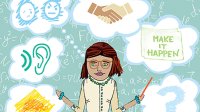The Answer to Our Education Woes
Getting curious, slowing down, and listening to each other are a few of the essentials necessary for addressing the larger problems in education.
Your content has been saved!
Go to My Saved Content.I was recently asked, “What is the answer to our education woes?” My answer: “I don’t know, but I have a few thoughts about what it’ll take for us to find the answers.” Here’s what I’m certain must be a part of the process.
We’ll Need to Slow Down
There’s no way we’re going to find answers while working and moving at the pace at which most schools and districts are moving. Einstein once said that if he had an hour to save the world, he’d spend 55 minutes defining the problem and five minutes finding the solution.
When was the last time in our schools that we spent 55 minutes exploring a problem? Examining root causes? Identifying all the factors involved in the creation of a problem? The pace at which we work isn’t healthy or sustainable, nor is it helping us figure out how to transform our education system.
We’ll Need to Listen
We’ll need to start by learning how to listen because most of us don’t really listen very much. We register the sounds someone else is making so that we can figure out where to insert a comment, add a story, disagree and make an argument, or provide some information and fix a situation. Or we register sound and tumble into a whole range of feelings about the speaker: We judge, distance, and dislike. Most of the time, there’s not much listening going on.
Here’s where we have to start listening if we want to fix our schools: to kids and to their parents and community. If our schools exist to serve children, that’s where we start, by listening to kids, including the tiny ones—they have feelings and thoughts, too.
We’ll Need to Be Sad and Angry
When those kids start talking, when their parents start telling their truths, our hearts may break. Much violence has been done in the name of schooling. Some of us experienced that when we were kids: Our needs weren’t met, our spirits were squashed and contained, or our languages were ripped from our mouths.
We’ll need to experience that sadness and anger. We’ll need to know that we can emerge from it—and that liberation might lie on the other side of sadness. We can do this work and also be sad and be angry. It’s possible, and we might be more powerful with those feelings.
We’ll Need Community
Sadness and anger—as well as hope and joy—need community. We’ll need to strengthen the communities we’re already in and heal the wounds we’ve made. We need to figure out how to listen, and how to talk to each other so that we don’t continue hurting each other.
We need healthy conflict so that we can have the hard conversations that need to be had, and we need to address unhealthy conflict in our communities. This means taking personal responsibility for the harm we’ve done, challenging cynicism and meanness, putting an end to gossip, and so much more. But this is what needs to be done if we’re to find answers to our education woes.
We’ll Need Will
This isn’t going to be easy, finding answers to what’s not working in our schools. My belief is that the problems lie in the last 500 years. Deconstructing that history, unearthing the dysfunctions, engaging in the myriad of hard conversations that will need to be had will necessitate deep conviction and commitment.
Each one of us will need to dig deep and identify sources of will, conviction, and commitment. In our communities, we’ll need to share our sources with each other so that we can hold each other accountable to those commitments.
We’ll Need Curiosity
I don’t know the answers, and I’m wary of anyone who professes to know them. Without collective curiosity, I suspect we might continue to replicate the status quo in our efforts to reform schools. I have ideas about things we might try, and as I encourage others to try them, I always say something like this: “Let’s just try and see what happens.” With our hearts and minds open, some of our efforts might result in the outcomes we want to see for children, and from there, we’ll identify next steps.
The journey of a thousand miles begins with one step and an open heart. It begins on a path with others and an agreement to go slowly—one step at a time, while listening.
